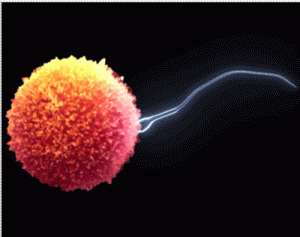 I don’t know how many times I have heard it. Well-meaning Catholics who say, “As a Catholic, I believe life begins at conception.” I have decided that my mission in life is to correct this miscommunication because it is that very line that lets everyone who is not Catholic dismiss everything we have to say about stem cell research, cloning and reproductive technologies.
I don’t know how many times I have heard it. Well-meaning Catholics who say, “As a Catholic, I believe life begins at conception.” I have decided that my mission in life is to correct this miscommunication because it is that very line that lets everyone who is not Catholic dismiss everything we have to say about stem cell research, cloning and reproductive technologies.
We Catholics do not “believe” life begins at conception, also called fertilization. We instead know that it does because it is a cold hard fact of nature that a new, distinct, human organism, identifiable by his or her unique DNA, is created at the completion of fertilization. That is not a belief. That is a fact.
A fact bolstered by embryology:
“Although human life is a continuous process, fertilization is a critical landmark because, under ordinary circumstances, a new, genetically distinct human organism is thereby formed.” (O’Rahilly, Ronan and Müller, Fabiola. Human Embryology and Teratology, 2nd edition. New York: Wiley-Liss, 1996, p. 8 )
Even a secular children’s book on human reproduction from my local library is clear:
“But nine months before, when you first began, you were just one little cell, even smaller than the dot at the end of this sentence. Half of this cell came from your mother’s body, and the other half came from your father’s body.”
I am not alone in my distaste for that common “I believe that life begins at conception” phrase. The late Dr. Bernard Nathanson also took umbrage with the word “believe” when discussing the facts of life. He wrote in his “Confessions of an Ex-Abortionist”:
“Fetology makes it undeniably evident that life begins at conception and requires all the protection and safeguards that any of us enjoy….As a scientist I know, not believe, know that human life begins at conception.” [emphasis mine]
[And for you sticklers for nomenclature, in recent years, practitioners of in vitro fertilization (IVF) have redefined conception as the implantation of an embryo in the uterus. This allows them to say that prior to implantation, an embryo has yet to be conceived. This implies that a new human organism begins at implantation instead of fertilization which is scientifically incorrect. The Catholic Church uses conception in its correct and traditional usage, meaning fertilization.]
So why do we debate the question of “when human life begins?” I believe it is because the debate about when life begins is actually focused on the wrong question or rather questions. It is not a matter biologically of when a new human organism begins. That is an established fact.
The real debate is about whether or not human life has value, whether or not an embryo or fetus has moral worth simply because he (or she) is human. And whether or not every human life, despite it’s point of development, deserves respect and protection.
When people say that life does not begin at conception what they are really saying is that they do not believe that embryonic life has value and that it does not deserve to be protected.
The Catholic Church teaches that the new human life that begins at conception has dignity and worth simply because it is human. Catholics know that human life is present from the moment of fertilization. We also hold that all human life is intrinsically valuable.
Even in a increasingly secular world, society understands that the taking of an innocent life is a moral trespass that cannot be allowed. Hence the prohibition of homicide in secular law. The basis of this understanding is the reality that human life does indeed have value simply because it is human. (Even France, where creating embryos for research is banned, has a law regulating research on embryos that lists the following core principles as guidelines, “Respect for the dignity of the human embryo” and “Respect for all stages of life.”)
There are others who want to qualify and restrict which human lives are considered valuable because of a particular agenda. We know who they are. But the Catholic Church does not make any qualifications. Regardless of point of development, Catholics acknowledge the inherent dignity in every human organism. To assign value to human life at some developmental point after conception is simply arbitrary.
Lee M. Silver, professor of Molecular Biology at Princeton University, wrote in his book Remaking Eden: How Genetic Engineering and Cloning Will Transform the American Family:
“Once fertilization is complete, there are no isolated moments along the way where you can point at an embryo or fetus and say that it is substantially different from the way it was a few minutes, or even hours earlier.”
Everyone one of us is a continuous organism from the moment we are conceived to the day that we die. It is illogical that we be valued and protected under the law only for a part of that continuous process.
So the next time someone says to you, “Human life does not begin at conception,” correct them and tell them that life indeed does begin at conception and what they really mean to say is “I don’t believe the life that begins at conception has value.” (And then explain to them why that stance is totally illogical.)
And if you must use the word “believe” when discussing the beginnings of life, please do not say, “I believe life begins at conception.” Say instead, “I believe the life that begins at conception has moral worth simply because it is human.”



